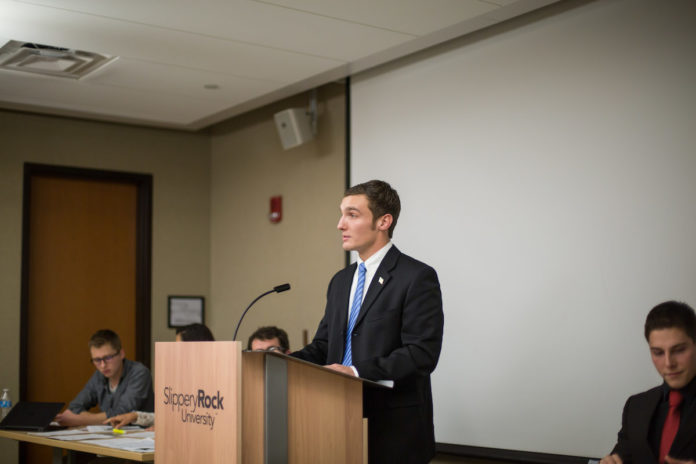On Wednesday evening, the College Republicans and Democrats held their first debate of the semester. The topic was the 2nd Amendment to the Constitution, one that guarantees the American people the right to bear arms. The debate surrounded the idea of whether or not the amendment should be amended or left in its current state. This is in the wake of recent mass shootings that occurred in Texas and California.
The debate was moderated by Political Science professor Dr. George Brown. The debate was formatted by members of each organization alternating three-minute speeches, with two minutes allotted for rebuttal between each speaker. Following this, there was a long section where the debaters fielded questions posed by the audience. There was no formal point system, as the debate served mainly to start a dialogue about gun violence in America.
“Some people say that the only people the 2nd amendment is referring to is the militia, but who is the militia? The militia was listed as all white males from ages 18-45. Does that mean minorities and women shouldn’t be allowed to own guns? Of course not,” said College Republicans President Brian McLaughlin to begin the debate. “The people’s right to bear arms is protected by the 2nd amendment, unconnected with service in any militia. Highly regulating guns is a direct infringement on the rights of American citizens to protect themselves.”
Jake Cribbs responded after McLaughlin, saying “The second amendment is perhaps the worst drafted of all constitutional amendments. As famous conservative Supreme Court Justice Antonin Scalia once said, ‘The 2nd amendment, like most rights, is not unlimited.’ We must recognize the vagueness of what amounts to one sentence. There is a direct correlation between firearm laws and a decrease in deaths per 100,000 people.”
The tone of the debate was set from these opening statements. The Republicans and Democrats were both skeptical of the statistics utilized by the opposition. Dr. Brown attempted to check information that was relayed by various speakers over the course of the evening. Both organizations agreed that in future debates a fact checker should be utilized to keep the teams honest.
“When our government banned alcohol, the people found a way. When our government cracked down on illegal drug use, the people found a way. By banning guns, you do not stop individuals who are intending to cause harm to law-abiding citizens,” said Republican speaker Brady Moore. “Taking guns away from the average law-abiding citizens is taking away their fighting chance of defending themselves against dangerous individuals.”
College Democrat’s President Phil Abegg spoke next, citing developed nation where gun control laws have proven to be effective, “Australia, Germany and the United Kingdom are prime examples where restrictions on guns have proven to be effective. Germany regularly adjusts their policies on guns following mass shootings. Australia hasn’t even had a mass shooting since their Prime Minister introduced a buy-back program following the 1996 massacre in Tasmania.”
Republican Matt Hemmerlin invoked the words of famous liberal author in defense of maintaining the 2nd amendment stating, “That rifle on the wall of the laborer’s cottage or working class flat is the symbol of democracy. It is our job to see that it stays there. Even a recognized liberal like Orwell is able to recognize the necessity of an armed populous to ward of a tyrannical government.”
Hemmerlin responded to the Democrats’ criticisms of the American people being able to fend off a tyrannical government by citing instances like the American Revolution. “The second amendment is the only amendment that effectively checks our government’s authority. Defense against tyranny is a basic right that must remain untouched.”
The last speaker was Olivia Kass, who drew attention to the issue of domestic violence in it’s relation to gun violence. “54% of mass shootings from 2009-2016 were a direct result of domestic violence. 4.5 million American women report that an intimate partner has been threatened with a gun. If we had more restrictions on guns, less women would have to live in fear and these numbers would dip dramatically.”
The speakers then fielded questions from the audience to conclude the debate. The audience was mainly looking for clarification for some of the sources used by the speakers. Both teams were quick to provide sources for their information upon request and expressed confidence in the validity of their arguments.
Both parties expressed interest in further debates on new issues such as morality in the United States beginning next semester. No official date has been set for a second debate at this time.








